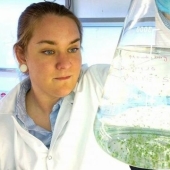
Industrial aquaculture of sea lettuce (Ulva) – a strong research basis enables the development of a sustainable future crop
Industrial aquaculture of sea lettuce (Ulva) – a strong research basis enables the development of a sustainable future crop

Industrial aquaculture of sea lettuce (Ulva) – a strong research basis enables the development of a sustainable future crop
About the speaker:
Sophie is a researcher at the Tjärnö Marine Laboratory of the University of Gothenburg (Sweden) dedicated to investigating the marine biodiversity of macrophytes and supporting a sustainable seaweed aquaculture in the Northern Hemisphere. She is closely collaborating with the European seaweed industry and developed techniques and protocols for the sustainable large-scale cultivation of sea lettuces (Ulva). During her PhD at the GEOMAR Helmholtz Centre for Ocean Research Kiel (Germany), Sophie investigated the taxonomy of different genera of marine green algae and the impact of environmental factors on their distribution and potential to form blooms. In addition to her work, she has a passion for communicating phycology to a broader audience by showing the beauty and importance of seaweeds and raising awareness for a sustainable seaweed industry.
Company info:
Tjärnö Marine Laboratory is a field station that is part of the University of Gothenburg and is located by Sweden's most species-rich marine area in the northern part of Bohuslän province, next to Kosterhavet National Park. The Tjärnö Marine Laboratory servers as a place for marine university education and research within marine sciences, mainly evolution, aquaculture as well as nature conservation and management.
Presentation:
Aquaculture of sea lettuces is continuously increasing. The high productivity, wide environmental tolerance, as well as the interesting functional and nutritional properties of Ulva biomass are accompanied by its multi-purpose-use in different industrial sectors. Due to the multi-applicable usage of this renewable resource, there is a rapidly growing interest in efficient production technologies to foster a large-scale industrial production of seaweed biomass. This talk will focus on the state-of-the-art research frontier of Ulva aquaculture technologies in the Northern Hemisphere with an emphasize on large-scale oceanic cultivation to enable a sustainable downstream application of Ulva biomass.
Keywords:
Sea lettuce, Ulva, off-shore aquaculture, protein, industrial cultivation
Interview
1. When was the first time you got involved with seaweeds and why?
On a professional level, I got in contact with seaweeds already during my undergraduate studies during a lecture on primary producers of our oceans. Especially the underwater forests cought my attention. I was fascinated by the seaweed diversity and their provision of ultimately important ecosystem services. Since then algae and especially seaweeds have become my study and research focus and I am still fascinated by them everyday.
2. What is your view on the European seaweed industry in 2030?
EU´s Blue Economy, and therewith the seaweed industry, is rapidly growing and expanding - which I personally see as a great step towards a more sustainable future. We have however learned from humanites past, especially during the Green Revolution of the past century, that we have strongly over-exploited our valuable ecosystems. I am convinced that with a solid research basis, that supports maintaining healthy ecosystems, we can sustainably use our oceans by applying a circular seaweed aquaculture.
3. What will you be talking about at Seagriculture EU 2023?
I am happy to take a deep dive with the audience into the cultivation of sea lettuces in the Northern Hemisphere. Due to the multi-applicable usage as renewable resource, there is a rapidly growing interest in efficient production technologies to foster a large-scale industrial production of Ulva biomass. My talk will focus on the state-of-the-art research frontier of Ulva aquaculture technologies in the Northern Hemisphere with an emphasise on large-scale oceanic cultivation and the subsequent downstream application of the biomass.